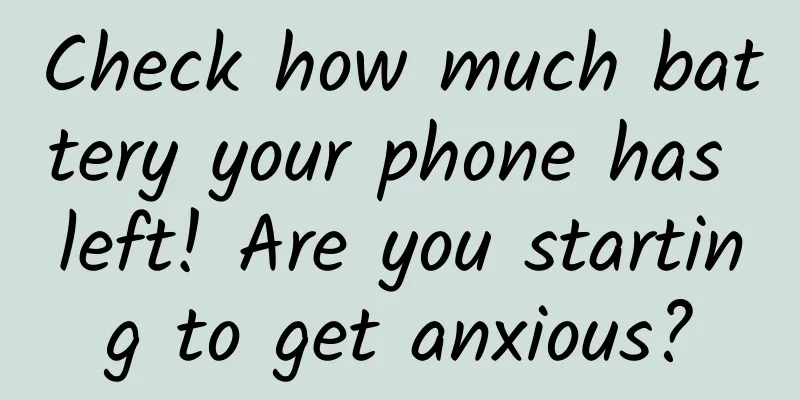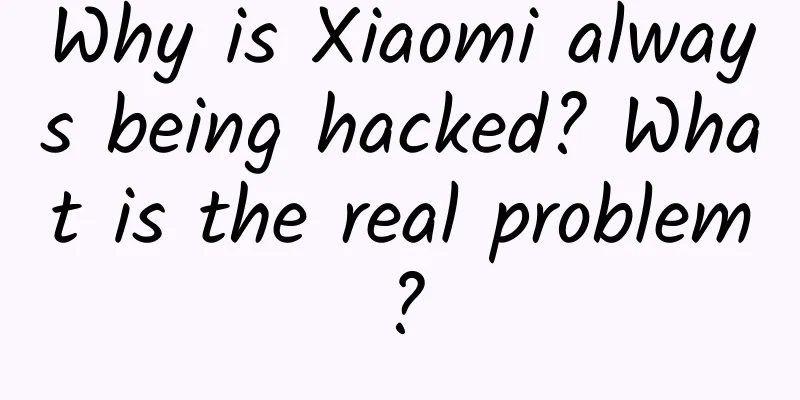Check how much battery your phone has left! Are you starting to get anxious?

|
Mobile phones are indispensable electronic products in modern people's daily lives. It can even be said that people nowadays can go out without bringing anything else, but mobile phones are absolutely a must. Shopping, entertainment, chatting and socializing... While mobile phones have brought many conveniences to people, they have also brought many new anxieties to many people. For example, "signal anxiety" has recently become a hot search topic, and everyone in the comments has begun to discuss how "frustrating" it is to have no mobile phone signal. Image screenshot: Weibo hot search 01 Is it normal to feel anxious about your phone? Mobile phones are indeed a necessity in modern times, so some anxiety is normal, such as low battery, no signal at a critical time, etc., but many people's anxiety goes beyond these normal ranges and becomes mobile phone addiction or mobile phone dependence. It refers to a person's inability to control the use of mobile phones, which eventually leads to negative effects on daily life. According to a 2018 meta-analysis, the proportion of mobile phone addiction among Chinese college students is about 23%, which means that more than 1/5 of college students have the problem of mobile phone addiction. According to the "University Students' Mobile Phone Addiction Tendency Scale" compiled by Xiong Jie and others, there are four aspects to judge whether a person's mobile phone dependence is serious: Withdrawal symptoms refer to the discomfort caused by being away from your phone for a period of time, such as frequently checking for new messages, feeling lonely or uncomfortable, and frequently having the illusion that "my phone is ringing or vibrating." Prominent behavior refers to obvious dependence on mobile phones, such as paying too much attention to the phone and affecting study or work, and people around you will say that you are too dependent on the phone. Social soothing refers to the soothing effect of mobile phone chatting, such as preferring to send messages on the phone rather than communicate face to face, and feeling more confident when chatting on the phone. Mood changes refer to the changes that the phone causes to your emotions. For example, when waiting for someone, you always have to use the phone to ask where the other person is, otherwise you will become anxious and afraid that the phone will shut down automatically. When the phone has no signal, you will become irritable. The more of these symptoms are met, the more serious the mobile phone dependence is. Copyright images in the gallery. Reprinting and using them may lead to copyright disputes. 02 Psychological issues behind mobile phone addiction Many people know that excessive dependence on mobile phones can have many negative effects on us, including reduced academic performance, anxiety and depression, but what is easily overlooked is what factors can easily make people overly dependent on mobile phones. First of all, loneliness is a very important factor, which refers to the complex feelings that arise when an individual's intimacy and social needs are not fully met. In fact, loneliness has become a new "epidemic" in modern society. According to the BBC Loneliness Experiment initiated by the British Broadcasting Corporation (BBC) on the Internet, involving 54,988 people in 237 countries and regions, the loneliness rate among young people has reached 40%. Image source: https://www.bbc.com/zhongwen/simp/uk-45729511 A survey data published in BMC Public Health, which collected data from about 25,000 people, showed that 39.7% of young people felt lonely, while 43.3% and 48.2% of middle-aged and elderly people felt lonely. Although the data from different studies vary, they all show that the prevalence of loneliness in modern society is quite high. Not only that, many studies have found that loneliness can positively predict the degree of mobile phone dependence, that is, the stronger the loneliness, the more serious the mobile phone dependence. Researchers believe that addictive behavior evolves from habits. When a person's habitual behavior turns into a must-do behavior, it becomes an over-dependence. Humans have social instincts and needs. When people cannot obtain sufficient social connections, they will feel lonely, and mobile phones have become a means to meet social needs. In the long run, mobile phones have become their indispensable dependence. Secondly, social anxiety and motivation for use are also important factors. On the one hand, people with social anxiety will feel lonely, and on the other hand, they will feel anxious about establishing real interpersonal relationships and make negative judgments about social situations. In order to avoid face-to-face interactions and negative evaluations, online communication on mobile phones has become a substitute for social interaction, forming an excessive dependence. Psychologists generally believe that there are two main motivations for using mobile phones, including entertainment motivation and escape motivation. When people use mobile phones mainly for escape motivation, such as escaping from social interaction and loneliness, escaping from reality, they will be more likely to become dependent on mobile phones. Copyright images in the gallery. Reprinting and using them may lead to copyright disputes. 03 5 ways to improve your phone addiction Due to the convenience of mobile phones, a certain degree of mobile phone dependence is inevitable. However, once it exceeds the normal range, it is easy to cause anxiety and affect your normal life. Then we can consider this as mobile phone addiction. In order to return to normal mobile phone usage, we need to change our bad mobile phone usage habits. Here, I offer the following suggestions: 1. Set a time limit Nowadays, many mobile phones or apps have built-in mobile phone usage time statistics, and even have usage time limits. We can use these functions to set limits on mobile phone usage time. It should be noted that it is incorrect to drastically reduce the time you use your mobile phone, and it may even lead to counterproductive effects. The best approach is to take small steps and gradually reduce the usage time by small amounts, which will make it easier to achieve the ultimate goal. 2. Break down your phone usage time Mobile phone dependence is related to habitual long-term use. An effective way is to break down the mobile phone usage habits and then gradually reduce the time for each part. For example, if you often use your mobile phone before going to bed, then reduce the time of this part first. At the same time, by frequently checking your mobile phone usage habits, you can also find out what causes your over-dependence and improve your mobile phone usage problems accordingly. Copyright images in the gallery. Reprinting and using them may lead to copyright disputes. 3. Find alternative activities Setting time limits is certainly effective, but we are used to spending a lot of time on mobile phones. Suddenly reducing the usage time will cause discomfort and emptiness. At this time, it is best to find some activities that can replace mobile phones, such as reading, exercising, traveling with friends, etc., especially when you use your mobile phone for escape motives, these activities can often provide a healthier sense of satisfaction. 4. Develop a habit of self-discipline Excessive dependence on mobile phones is largely related to poor self-control. Fortunately, self-control is a "global setting" for the brain, which means that when your self-control in one thing is poor, your control in other aspects may also be poor. Conversely, if we develop self-discipline in other areas, it can also affect our ability to control the use of mobile phones. Therefore, we can find something else, such as practicing calligraphy, flower arranging, painting, getting up early, etc., set small goals and stick to them, which can increase our ability to control ourselves. 5. Set up a reward and punishment system for yourself Develop a reward system to motivate yourself to reduce your phone usage time. For example, every time you successfully control your phone usage time, reward yourself with some small enjoyment, such as watching an episode of your favorite TV series, enjoying a delicious meal, etc. References: [1] de Vlaming, R., Haveman-Nies, A., Van't Veer, P., & de Groot, LC (2010). Evaluation design for a complex intervention program targeting loneliness in non-institutionalized elderly Dutch people. BMC public health, 10, 1-9. [2] Lepp, A., Barkley, JE, & Karpinski, AC (2014). The relationship between cell phone use, academic performance, anxiety, and satisfaction with life in college students. Computers in human behavior, 31, 343-350. [3] Tao, J., Luo, C., Huang, J., & Liang, L. (2018). Meta-analysis of the current situation of mobile phone dependence among college students in China (in Chinese). Chinese Journal of School Health, 39(9), 1391–1394. [4] Xiong Jie, Zhou Zongkui, Chen Wu, You Zhiqi & Zhai Ziyan. (2012). Development of a mobile phone addiction scale for college students. Chinese Journal of Mental Health (03), 222-225. [5] Hu Qian. (2020). Intervention study on mobile phone addiction tendency of college students (Master's thesis, Chongqing Normal University). [6] Liu Hong & Wang Hongli. (2011). The relationship between college students’ mobile phone addiction, loneliness and mobile phone use motivation. Psychological Science (06), 1453-1457. [7] Shen Xi & Ran Guangming. (2018). The impact of social anxiety on excessive smartphone use: the mediating role of loneliness and motivation. Psychological Research (06), 570-576. Author: ACC Psychology Popular Science Creator Reviewer: Tang Yicheng, Deputy Director of Beijing Zhongke Popular Psychological Health Promotion Center The cover image and the images in this article are from the copyright library Reproduction of image content is not authorized |
<<: [Popular Science of Chinese Military Technology] How to gain an advantage in urban warfare?
>>: Popular Science Illustrations | How Technology Helps Intangible Cultural Heritage
Recommend
The world’s largest clean energy corridor, what are the “world’s best”?
As the world's largest clean energy corridor ...
Are these 13 sayings about drinking water true or false? Let’s find out in one article today!
The all-mighty and caring greeting: "Drink m...
How to improve the conversion rate of old customers bringing in new customers?
In simple terms, bringing in new users means find...
Subsidies for new energy vehicles are withdrawn, and the income from point trading is only 1/10 of the subsidies
How can enterprises bear the high costs after the...
Product Operations: What are the common processes and techniques for product optimization?
In the article, the author summarizes the previou...
Evergrande officially becomes Guanghui's second largest shareholder, with 7.8 billion yuan of additional capital already in place
On November 6, Guanghui Energy, Guanghui Automobi...
What is so mysterious about Daliang Mountain, the prototype of "In the Octagonal Cage"?
The film "In the Octagonal Cage" tells ...
Online education APP operation: How to motivate users to complete course learning?
In an era where mobile Internet is so popular, mo...
Sony HT-S500RF review: Turn your living room into a home theater in seconds with a 5.1-channel soundbar
If you want to turn your living room into a home ...
Analysis of Pinduoduo’s “Shake for Cash” campaign operations!
Have you participated in Pinduoduo’s “Shake for C...
The nicknames of the Winter Olympics venues are all about Chinese romance!
The "Water Cube" has been transformed i...
Midas Touch "Live Flow Control Master" analyzes and understands traffic control, full of practical information
Midas Touch Live Streaming Controller, a comprehe...
Contact for 10 seconds can cause infection, and severe cases can cause liver damage! The recent high incidence of the virus has caused the China Centers for Disease Control to issue a series of warnings →
As spring arrives and the temperature rises, are ...
How can the education industry seize the opportunity of winter vacation and acquire customers accurately?
In the education industry, the era of "let&#...
The latest evidence: The romantic "nuptial flight" in the insect world existed 100 million years ago!
Swarm is a group gathering behavior that occurs d...









